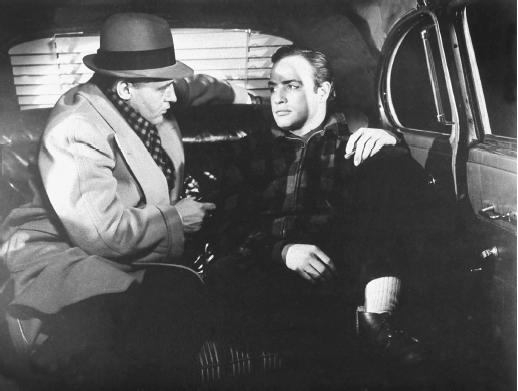
Directed by: Elia Kazan
Starring: Marlon Brando, Rod Steiger, Eva Marie Saint, Lee J. Cobb, Karl Malden
The Plot: A boxer-turned-dockworker struggles with his conscience as he decides whether to testify against a corrupt union boss responsible for murder and racketeering.
On The Waterfront won eight Oscars in 1954 including Best Picture and Marlon Brando's only Oscar that he didn't publicly refuse. It is gritty and idealistic, but is held back somewhat by Terry's budding relationship with Edie (Saint-also an Oscar winner), the sister of his friend, Joey Doyle, whom he unwittingly set up to be killed by mobsters. Once he acknowledges his involvement with her brother's death, it is seemingly forgotten about when they kiss passionately. The ending is also awkward and goes out of its way to let Terry live even though realistically the people he testified against would whack him.
In between, though, there are many interesting questions brought up, mainly by Malden's character, Father Barry, the local parish priest who investigates Joey's death. How much would a person be willing to stay quiet about to protect his livelihood? Or himself? Or his family? The workers of these waterfront docks witness corruption, beatings, and even murders almost daily. They are rightfully terrified to speak up when local police and investigators start asking questions. Terry Malloy is approached by investigators who want him to testify at corruption hearings, yet he is hesitant because he is given cushy jobs on the docks and a certain level of respect by union boss Johnny Friendly (Cobb). Terry's brother Charlie (Steiger) is also a member of the union's corrupt inner circle, but Charlie does what is best for business more than what is best for his brother.
The movie's most famous scene is Terry's "I coulda been a contender" speech to his brother in the back of a taxi. Years before, Charlie asked his brother to take a dive during a fight he easily could've won. The fight could've turned him into a contender for the title, but instead he chose to throw the fight so Charlie's gambler friends could make money. Now, with his fight career a distant memory, he is under the thumb of Friendly and his brother. Could testifying be the chance to break free? Could he be a somebody at long last?
Brando's performance earned him an Academy Award for Best Actor. Terry is a punch drunk simpleton who doesn't want to make waves. However, Father Barry and Edie sense his inner conflict and his fear. He doesn't want to disloyal to Charlie mostly, but his conscience keeps nagging at him. At one point, he says, "Conscience. That stuff will drive you nuts." To him, a conscience is a real inconvenience, but one he can't ignore. In his later years, Brando could sometimes be caught "acting", but here he is very convincing as he goes through inner changes.
Malden, who co-starred with Brando and won an Oscar for 1951's A Streetcar Named Desire (also directed by Kazan), is the film's moral center. Malden is a tall rock who is powerful and authoritative in every scene he is in. Malden's screen presence was exceptional even in films like 1981's Miracle On Ice, when he played Herb Brooks who in real life was 25 years his junior. Lee J. Cobb plays Friendly as a loudmouth blowhard who is always looking to tear someone's head off. I wondered how his underlings could stand being around him. Why would they be loyal to such a creep?
Perhaps when On The Waterfront was released sixty years ago, it had much more power than it does now. The first half of the film creates a hermetic, almost prison-like feel for the docks and the people who lived there. The Terry-Edie thing is underwhelming and then the unconvincing ending. However, the film plays best when it raises questions about how much one person can stand in the name of a few dollars and temporary security.
No comments:
Post a Comment